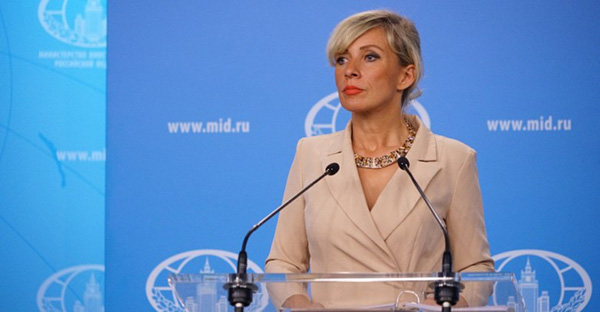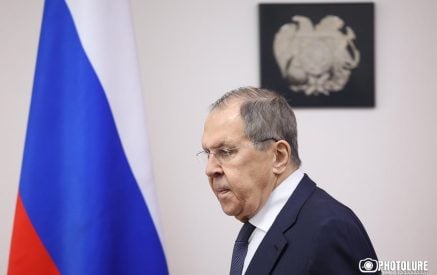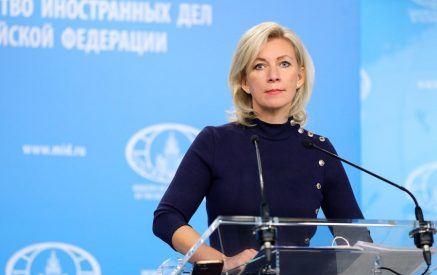civil.ge. Russian Foreign Ministry Spokesperson Maria Zakharova concluded her news briefing on September 12 with wide-ranging statement concerning Moscow’s view on the situation in the South Caucasus.
“Our western, especially American counterparts, keep on making unfounded accusations against Russia, Abkhazia and South Ossetia with enviable persistence. Meanwhile, instead of ensuring peace and security in the Caucasus, they spare no effort to destabilize the situation in the region,” she stated.
Zakharova argued that Washington and Brussels, citing “security” concerns in Georgia and the region as a whole, are supplying Tbilisi with armament, and “dragging it into the military blocs [NATO]”… “speaking about occupation, etc., etc.”
She reiterated official Russian position that the statement made at the NATO Bucharest summit that Georgia is “guaranteed” membership of NATO, “was perceived by [ex-President Mikheil] Saakashvili regime as a direct for aggression against South Ossetia”, which in turn led to “changes in the region” [referring to Russia’s recognition of the two regions as independent states], while arguing the reasons behind these changes are “persistently being ignored by the western officials and analysts.”
Read also
She said Abkhazia and Tskhinvali Region/South Ossetia, which are relying on Russia’s “allied support” for ensuring their security, “are strengthening their statehood despite the persisting problems.”
According to Zakharova, both regions have “successfully developing” economies, social life, foreign trade and international ties. “Overall, in recent years, Abkhazia and South Ossetia, which have been seriously affected by Georgia’s aggression and economic blockade, have certainly proved themselves as sovereign, independent states,” she argued.
Zakharova added that the legislative, executive and judiciary branches, as well as overall political environment and democratic processes are developing “in both republics.” She also noted that Sokhumi and Tskhinvali are “strengthening their international positions”.
She welcomed the “election” of Raul Khajimba as Abkhazia’s “president”, arguing that the process serves as “one additional proof of Republic of Abkhazia being a free, independent country, building its economy and other spheres of life on the basis of democratic principles.”
To become familiar with the “real situation in both republics,” Zakharova proposed that the “western counterparts” pay a visit and meet the local population.
Georgian State Minister for Reconciliation and Civic Equality Ketevan Tsikhelashvili slammed Zakharova’s remarks as “cynical.” Tsikhelashvil said the situation in the occupied regions is “grave,” and “the level of their dependence on Russia is very high.” She said both regions are “actually surrounded by barbed wire, movement is fully restricted to Tskhinvali, and families are divided.”
According to Tsikhelashvili, the humanitarian and security actors, which are denied access to Abkhazia and Tskhinvali regions for years, should be allowed to study the situation on the ground. She was apparently referring to the international organizations accredited to Tbilisi, as well as the European Union Monitoring Mission (EUMM) and the Council of Europe (CoE) rapporteurs.
Georgian Ministry of Foreign Affairs (MFA) also responded to Zakharova’s remarks, saying the country’s European and Euro-Atlantic aspirations, which are among its “key foreign and security policy priorities,” represent “a value-based choice of the Georgian people to return to the European family, and is by no means directed against anyone.”
“Joining EU and NATO is the guarantee of peace and development for Georgia as well as the entire region,” MFA’s Vladimer Konstantinidi said. He also noted that Georgia has proved its commitment to non-use of force and peace policy. “We are constructively engaged in peace negotiations and spare no efforts to solve security and humanitarian problems of the conflict-affected population,” he added.
According to the Georgian MFA, against the background of provocative actions from Moscow and occupation regimes, illegal militarization, erection of barbed wires and artificial barriers, closure of crossing points, and grave humanitarian problems, it is “cynical” to speak of “the statehood” of occupied regions, and aims at “diverting attention from the grave situation to other dimensions.”

























































